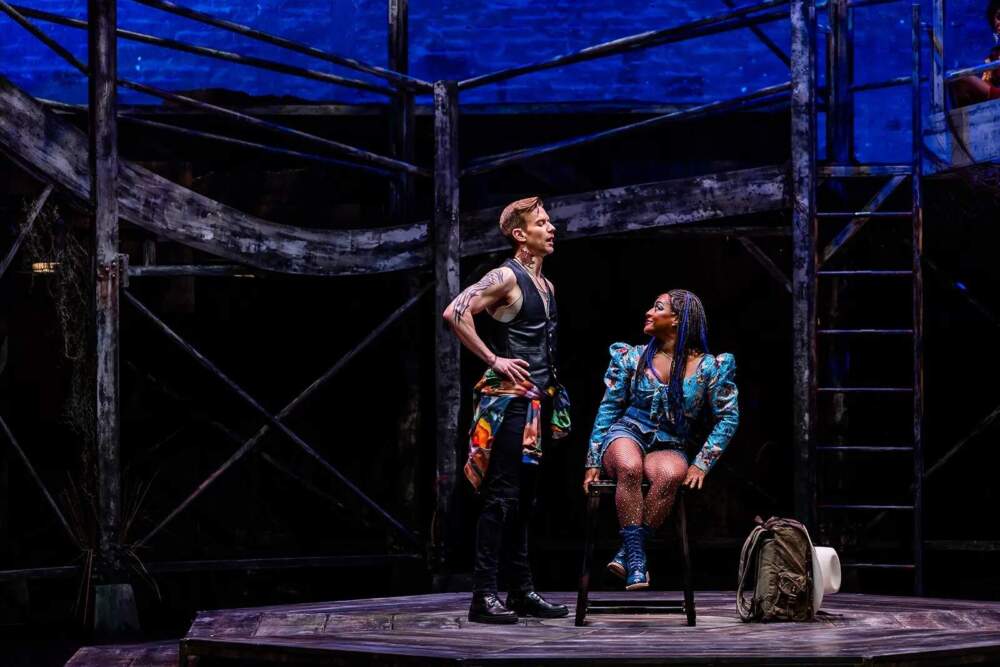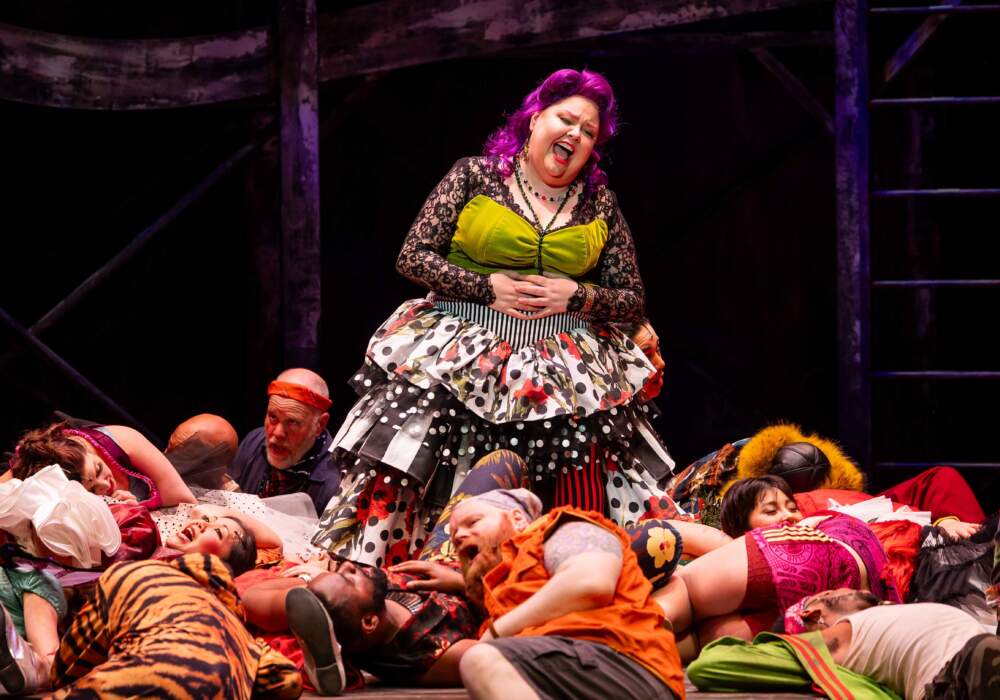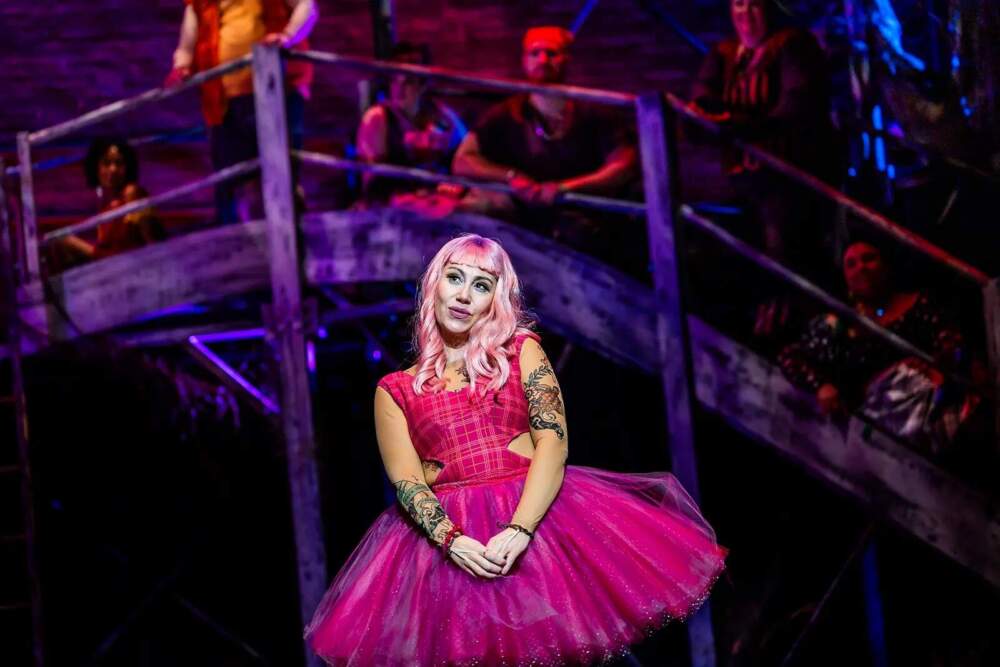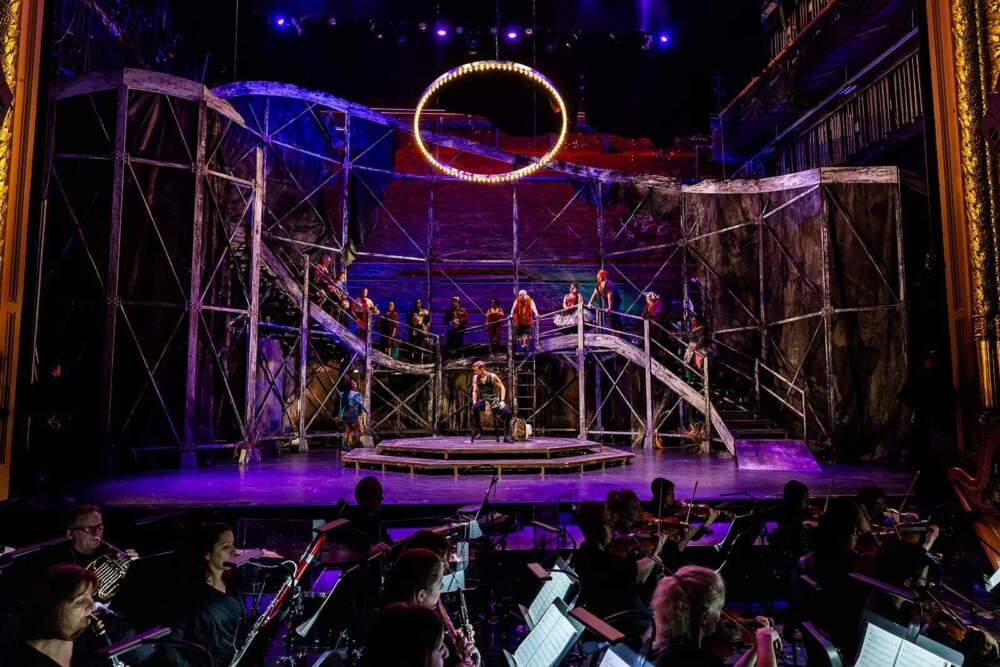Advertisement
Review
Boston Lyric Opera's 'Carousel' is hindered by its staging

Eighty years ago, “Carousel,” Richard Rodgers and Oscar Hammerstein II’s second and perhaps most endearing collaboration, played its final pre-Broadway tryouts at Boston’s Colonial Theatre. The show has been revived, of course, countless times since then, but thanks to the Boston Lyric Opera, it has now finally returned to the Colonial (through April 13).
The production looked very promising on paper, especially with staging by Anne Bogart, whose two recent BLO productions included an atmospheric Bartók “Bluebeard’s Castle” and an extraordinarily powerful and imaginative version of Poul Ruders’ “The Handmaid’s Tale” at a Harvard basketball gym. But for a contemporary audience, “Carousel” might actually create bigger challenges than “The Handmaid’s Tale,” and Bogart’s new production is not an unqualified success.
Based on the 1909 play “Liliom” by the Hungarian playwright Ferenc Molnár, “Carousel” is the love story between an innocent Maine millworker, Julie Jordan, and Billy Bigelow, a charismatic carnival barker. Their admirable sense of independence gets each of them fired from their jobs, and though they love each other and get married, poverty undermines their happiness. In one of their arguments, he hits her. After Julie gets pregnant, Billy lets a sleazy friend talk him into attempting an armed robbery, and when the robbery gets botched, Billy kills himself. Then in a surprising supernatural twist, Billy returns to earth 15 years later to comfort his unhappy daughter. When she rejects his gift (a star!), he hits her too. But he is again forgiven.
I was curious how a modern feminist like Bogart might deal with the issue of domestic violence, just as I wondered how the performers were going to handle Hammerstein’s corny Down East accents (“The vittles we et were good, you bet!”). Both of these questions, maybe for the better, remain largely unanswered. But this production raised some other questions it hadn’t occurred to me to ask.

The curtainless stage looks more like “Sweeney Todd” than “Carousel.” Sara Brown’s grim, gray, industrial-looking abandoned amusement park, with catwalks curving as uncertainly as a roller coaster, looms behind a chain-link fence with armed guards at the front of the stage. Hardly the festive carnival one expects. And Haydee Zelideth’s costumes seem an unsettling mélange of carnival attire (Julie’s friend Carrie Pipperidge wears a ratty pink tutu and silver boots) and some version of contemporary punk (Julie’s denim short shorts). It was odd to see no costume changes over the 15-year span of the story.
After the show, I read Bogart’s program note about the challenge of directing a “chestnut.” Her aim, she writes, “is to tap into the power of the original without altering its content.” And yet, she says, “In our version of ‘Carousel,’ a group of refugees arrive from a great distance to perform the play, seeking to gain access and acceptance.” I guess I should have read the note first. It explains the mysterious appearance of someone reading a book (the script?) who prompts the actors. But what does it add besides confusion to an understanding of the show?
Advertisement
“Carousel” was a hit in 1945, yet not quite the phenomenon of its predecessor, the (for the most part) cheerier and funnier “Oklahoma!” The leading roles were taken by two Broadway newcomers: the legendary John Raitt (Bonnie Raitt’s father) and Jan Clayton, maybe more familiar now as the mother on the “Lassie” TV series. But maybe along with “South Pacific,” from 1949, this is surely Rodgers’ best complete score. It begins with the swirling “Carousel Waltz,” his only overture that’s an independent composition, not the usual collection of tunes from the rest of the show. And it ends with the now over-familiar “You’ll Never Walk Alone,” the hymn-like anthem that has Hammerstein’s first lark reference (“the sweet silver song of a lark”), anticipating his icky “lark who is learning to pray” in “The Sound of Music,” his final show with Rodgers.
The most hauntingly beautiful song in the show is R&H’s most original and touching love duet, “If I Loved You,” the rare love song that seems to be about not falling in love (but of course it is). There’s a sublime clip of this duet with Raitt and Clayton from a 1954 TV tribute to Rodgers and Hammerstein:
One of Bogart’s big mistakes here is that in staging this intimate duet, the “concept” doesn’t allow her to leave the lovers alone together, but surrounds them with other people listening in. When Julie sings to Billy about the petals falling gently from the trees, the actors sitting behind her toss out handfuls of petals. It’s a stage gimmick. In the TV re-creation of the original, Billy himself picks up the fallen petals, and it breaks your heart.
Rodgers’ score embraces such memorable musical numbers as the rollicking “June Is Bustin’ Out All Over” and Billy’s astonishing 8-minute-long “Soliloquy (My boy Bill),” the closest Broadway ever got to a musical version of “To be or not to be.” And what a joy to hear less-familiar songs like the tender “When the Children Are Asleep” and the achingly poignant “What’s the Use of Won’drin’?”
Conductor David Angus and the terrific orchestra did most of the music more than justice, though I wish the opening “Carousel Waltz” had a little more oomph. One of Bogart’s best ideas (or that of choreographer Shura Baryshnikov) grew out of what seemed to be one of the worst: the complete absence of a carousel! But during that opening waltz, the performers, sticking poles in the bare central turntable, turn themselves into the carousel ponies.

The cast, too, was mostly strong, especially the featured players. Metropolitan Opera star mezzo-soprano Jamie Barton was in glorious voice as Nettie Fowler, Julie’s big-hearted cousin. She squeezed every ounce of humor out of “June Is Bustin’ Out All Over” and “This Was a Real Nice Clambake,” and she made you listen to “You’ll Never Walk Alone.” Too bad she’s forced to wear a garish ruffled dress that’s one of the production's true horrors.
As Carrie, bright-voiced soprano Anya Matanovič delivers her songs with pitch-perfect gusto. Despite being trapped in that ratty tutu, she seemed to be enjoying her time on stage. “(When I Marry) Mister Snow” is one of the shows high points, along with her duet with tenor Omar Najmi as her stuffy but lovable herring fisherman.
Baritone Markel Reed makes a lively and likable villain as Billy’s cheating friend Jigger Craigin. His seduction scene with Matanovič is another comic high point. In a speaking role, mezzo-soprano Sarah Heltzel is excellent in a hammy way as the blousy proprietress of the carousel who would also like to be Billy’s proprietress. And in another non-singing role, Lee Pelton, former president of Emerson College and CEO of the Boston Foundation, made an endearing Starkeeper, the heavenly spirit who allows the dead Billy to return to earth to see his daughter.

Louise, Julie and Billy’s daughter, is another non-singing role. The original Louise, dancing the legendary ballet choreographed by Agnes DeMille, was the exquisite dancer Bambi Linn. She became a star dancer in the early days of television. For the BLO, dancer, singer and actor Abigail Marie Curran made a strong but uncertain impression. Her thrusting and leaping struck me as overstated. It should have been the choreographer’s responsibility to get her under more control — unless she was giving Baryshnikov exactly what she wanted.
That leaves the two leads. Soprano Brandie Sutton gives Julie a kind of contemporary toughness that goes with the denim short shorts. That toughness also paradoxically heightens her vulnerability. Her voice rings out expressively. I would have liked to hear her (and everyone else in the company) without the amplification that I’m sure the original cast easily lived without at the Colonial in 1943.
Baritone Edward Nelson, who plays Billy Bigelow, seems to be a young star on the rise, but I’m sorry to say that he is the major disappointment of this production. He’s the singer most hurt by the amplification, which emphasizes the throatiness of his vocal production and probably contributes to the lack of nuance in his phrasing. Billy is one of Rodgers and Hammerstein’s great achievements. He’s a character who sings what he thinks, as what he thinks keeps evolving.
In “If I Loved You,” like Julie, Billy is in the process of imagining his future, discovering what it would be like to fall in love while he is in fact falling in love. “Ánd somehow I can see,” he sings, “just exactly how I’d be.” He’s singing his self-discovery. Just as in the “Soliloquy” he is imagining the future of his unborn child. His son, he realizes, might also be named Bill. But then he suddenly realizes, with more conflicted feelings, that this imagined son could be a daughter. And that discovery opens new windows of imagination. Real and deep self-discovery is what makes his songs so thrilling.
And poetry. Billy doesn’t realize the depth of his own poetic imagination:
“You can't hear a sound, not the turn of a leaf
Nor the fall of a wave hittin' the sand.
The tide's creepin’ up on the beach like a thief
Afraid to be caught stealin’ the land.”

The audience cheered Nelson after the “Soliloquy” and at the end he got the biggest hand. But in neither of his most important numbers could I hear that quality of discovery or poetry — Billy’s desperate underlying need to learn who and what he is, the need that makes this character so moving, is the very quality that makes us understand how his slap could feel like a kiss.
I found Nelson more compelling later in the show, after Billy’s death, especially in his demand to be judged by “The Highest Judge of All.” Brian H Scott’s lighting is particularly effective here, including the sudden use of house lights when Billy comes down an aisle of the theater on his way to heaven. But why does Bogart have him sing practically the whole second half of the song from offstage?
With that memorable score and good singers, “Carousel” still makes a powerful show. I’m not sure, as Julie says, that even a “stickler” (Hammerstein rhymes it with “partic'lar”) for old-fashioned, literal staging would mind some fresh inventiveness. But it’s very frustrating when the staging gets in the way of what’s most central to the show. If you, like me, love “Carousel,” then almost any production is worth seeing. And if you don’t already know it, this production is still worth seeing — or at least hearing—though some of it may leave you scratching your head.

